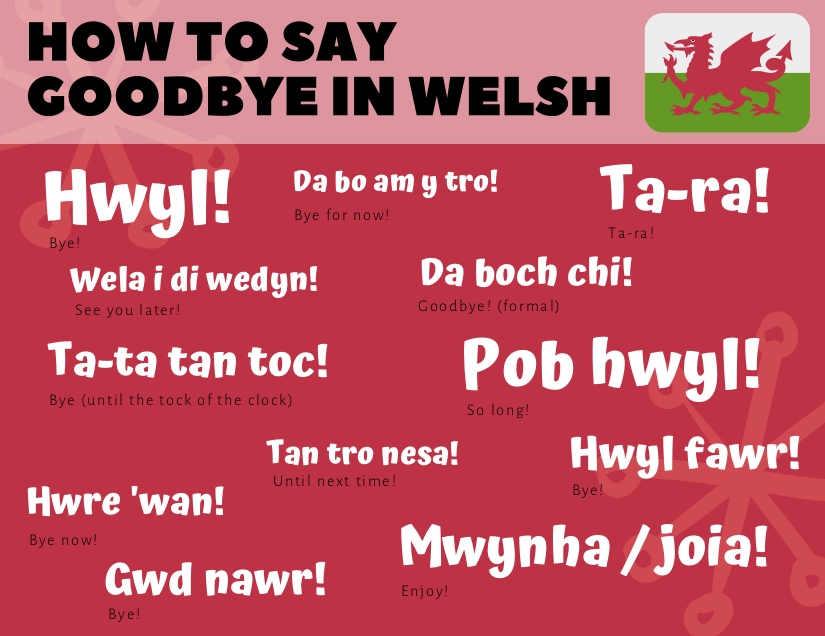
If you stop and think about how many ways there are of saying “goodbye” in English – from the standard “bye” and “see you later” to the more niche expressions like “cheerio” to “toodle-loo” – it should come as no surprise that Welsh has a wide range of phrases too. Let’s take a look at some of the most popular ones now! 🙂
1. Hwyl!
The most common word you’ll encounter at the end of a conversation in Welsh is ‘hwyl‘ which can mean a number of other things including “fun” “sail” or “mood” depending on the context of the sentence. For the purpose of this article though, let’s keep things simple and say that ‘hwyl’ = “goodbye”! 🙂
You can use it on its own or combine it with other words to create the following expressions:
- Hwyl fawr! (Lit: A big goodbye)
- Hwyl (am) rŵan! (Goodbye for now! NW)
- Hwyl (am) nawr! (Goodbye for now! SW)
- Hwyl i ti / chi! (Goodbye to you!)
- Pob hwyl! (Lit: Every goodbye!)
- Hwyl am y tro! (Lit: Goodbye for the time (being)!)
- Hwyl a fflag! (Lit: Goodbye and flag! – ‘Hwyl‘ probably refers to the alternate meaning ‘sail‘ in this case.)
Hwyl am rŵan!
Bye for now!
2. Ta-ra!
English speakers who live in Britain will already be quite familiar with “ta-ra” as an informal way of signing off. But what you may not know is that it is frequently used in Welsh as well!
The pronunciation can vary from a clear ‘ta-ra‘ to something closer to ‘trraaa‘. You might also hear ‘ta-ra ‘wan‘ in some parts of North Wales or quite simply, ‘ta‘!
3. Da bo ti / Da boch chi!
Another way of saying goodbye in Welsh is ‘da bo ti / boch chi‘. The closest literal translation I can think of is something along the lines of “good be you”. It isn’t as common nowadays, having been largely supplanted by ‘hwyl‘, but you may still hear ‘da boch chi‘ or simply ‘da boch‘ in more formal contexts. The informal ‘da bo‘ or ‘da bo am y tro‘ can also be heard in some regions in the south.
‘Bo‘ and ‘boch‘ are the present subjunctive forms of ‘bod‘ (to be) but rarely appear in modern Welsh with the exception of set phrases such as ‘cyn bo hir‘ or ‘lle bo angen‘.
4. Tan y tro nesa!
This useful phrase literally translates as “until the next time” in English. You can choose to drop the definite article ‘y‘ and say ‘tan tro nesa‘ if you wish.
5. Wela i ti / di / chi!
‘Wela i ti / di!‘ – which literally means “I will be seeing you!” – is as common in Welsh as it is in English as a way of saying goodbye. Most people mutate ‘ti‘ to ‘di‘ here in the north but don’t be surprised if you hear both variations.
When addressing an older person, a person of rank or status, or a group of people, make sure to use “wela i chi” instead.
You can combine this expression with the following words:
- Wela i di cyn bo hir! (See you before long / soon!)
- Wela i di nes ymlaen! (See you later on!)
- Wela i di wedyn! (See you later / afterwards!)
Wela i di cyn bo hir!
I’ll see you soon!
6. (Ta-ta) tan toc!
‘Ta-ta tan toc‘ is a jocular way of saying farewell in Welsh. It was made famous by weatherman Derek Brockway who used it at the end his Wales Today weather report on S’mae Shwmae Day. It literally means “ta-ta until a tock (of the clock)”.
7. Dan eich bendith!
‘Dan eich bendith‘ is a little old fashioned these days but it is still used amongst the older generation. It literally translates as “under your blessing” in English. Alternatively you may also hear ‘pôb bendith‘ (every blessing) or the more informal ‘dan dy fendith‘.
8. Hwre!
An expression that you might hear in the northern counties is ‘hwre‘ or ‘hwre ‘wan‘. The latter was made popular by the famous Pobol y Cwm character Meic Pierce who comes from Anglesey (Sir Fôn)!
9. Gwd nawr!
I admit I was completely unfamiliar with the expression ‘gwd nawr‘ until I started doing research for this article – probably because it is mostly used in South Wales. It is often followed by ‘te‘ (gwd nawr te). The meaning is the same as ‘hwyl fawr‘.
10. Mwynha / Mwynhewch / Joia / Joiwch!
The verbs ‘mwynhau‘ and ‘joio‘ mean the same thing in English (to enjoy). Both can be heard across Wales, although the former does seem to be used more in the north whereas the latter is more common in the south.
You can use them at the end of a conversation in the following imperative forms if you know that the person you’re speaking to is about to do something fun, such as go on holiday or meet a group of friends.
- Mwynha! Joia! (informal)
- Mwynhewch! Joiwch! (formal or to a group of people)
You can also say “Enjoy your day!” which roughly equates to “Have a nice day!” in English.
- Mwynha / joia dy ddiwrnod! (informal)
- Mwynhewch / joiwch eich diwrnod! (formal or to a group of people)
Mwynha dy ddirwrnod!
Enjoy your day!
Bonus: Ffarwel!
The greeting ‘ffarwel‘ isn’t used all that much these days but it is a perfectly legitimate way of saying goodbye in a formal (or tongue-in-cheek) context!
Can you think of any other expressions? If so, feel free to share them below! 🙂
